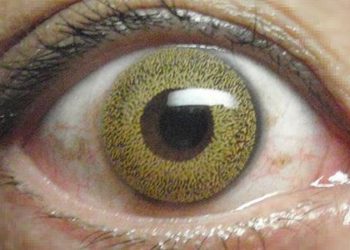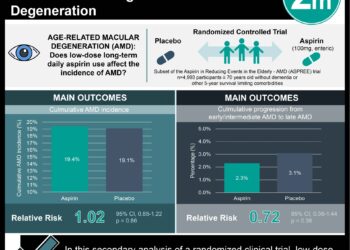The AREDS1: Zinc and antioxidant supplementation reduce progression of AMD in high-risk patients [The Classics Series]
1. In patients with advanced age-related macular degeneration (AMD) in one eye only or intermediate AMD in either eye, zinc and antioxidant supplementation reduced the risk of progression to advanced AMD and reduced the risk of moderate vision loss.
2. In patients with early stage AMD, supplementation did not reduce the risk of progressing to advanced AMD. No supplementation is recommended in early stage AMD, as the baseline risk of progression is low.
Original Date of Publication: October 2001
Study Rundown: AMD is the leading cause of irreversible vision loss in the world in individuals 65 years of age and older. Until the Age-Related Eye Disease Study 1 (AREDS1), no therapies were available to prevent the progression of AMD. Epidemiologic and animal studies had suggested that zinc and antioxidant vitamins could potentially be beneficial in treating AMD by targeting and reducing oxidative stress.
The AREDS1 was a randomized controlled trial that sought primarily to evaluate the effects of high-dose zinc and antioxidants on the progression of AMD and vision loss. The study found that, in those at high-risk of developing advanced AMD, a combination of zinc and antioxidants reduced the risk by 25% and reduced the risk of moderate vision loss by 19%. In patients with no AMD or early AMD, there was no benefit observed with supplementation, though the risk of progression was low with placebo.
Click to read the study in JAMA Ophthalmology
In-Depth [randomized controlled trial]: This multicenter, randomized, controlled trial recruited patients between 55-80 years of age with a best-corrected visual acuity of ≥20/32 in the study eye and a range of AMD abnormalities (i.e., from no abnormalities to one eye with features of advanced AMD). Exclusion criteria included obscured ocular media preventing macular photographs, any eye disease that could complicate assessment of AMD, and previous ocular non-cataract surgery. A total of 3640 patients were assigned to 4 ordinal categories of AMD (1-4) based on the extent of their macular findings, and subsequently randomized 1:1:1:1 to treatment with 1) zinc alone, 2) antioxidants alone, 3) zinc and antioxidants, and 4) placebo. The antioxidant formulation was a combination of vitamin C, E, and beta carotene, while the zinc formulation consisted of zinc and cupric acid. Patients were followed for 5 years or longer. The primary outcomes were disease progression, treatment for advanced AMD, and visual acuity loss of ≥15 letters. A p-value ≤0.01 was considered statistically significant.
Category 2 (early AMD), 3 (intermediate AMD), and 4 (advanced AMD in one eye) patients had a 1.3%, 18%, and 43% probability of progression to advanced AMD, respectively, in the placebo group by 5 years. Compared with placebo, zinc and antioxidant therapy led to significantly lower risk of progression to advanced AMD (OR 0.72; 99%CI 0.52-0.98, p = 0.007); the risk of progression was further reduced when category 1 and 2 patients were excluded from analysis (OR 0.66; 99%CI 0.47-0.91, p = 0.001). After excluding category 1 and 2 patients, zinc and antioxidant treatment also significantly reduced the risk of moderate vision loss compared to placebo (OR 0.73; 99%CI 0.54-0.99, p = 0.008).
Image: PD
©2017 2 Minute Medicine, Inc. All rights reserved. No works may be reproduced without expressed written consent from 2 Minute Medicine, Inc. Inquire about licensing here. No article should be construed as medical advice and is not intended as such by the authors or by 2 Minute Medicine, Inc.






